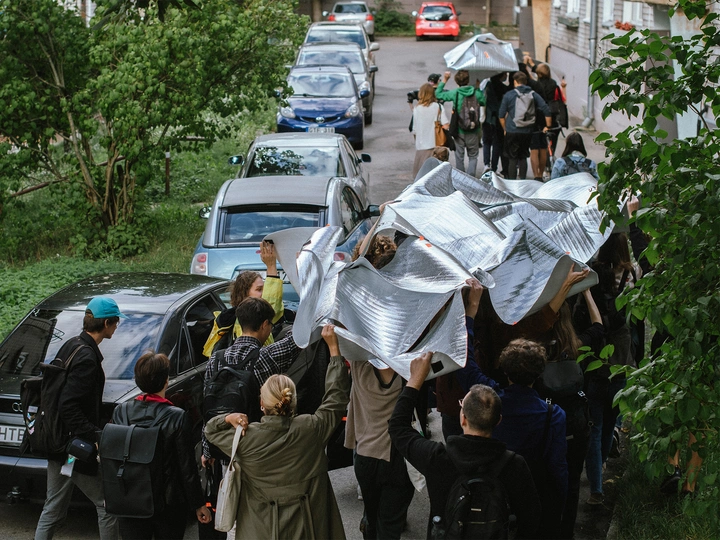Neo-futuristic Walks

Goda Verikaitė
Neo-futuristic Walks is an alternative urban research and design practice initiated by us - two spatial designers and urban researchers - Aušra Česnauskytė and Goda Verikaitė. Educated as architects, we noticed the lack of imagination and context-sensitive approach within dominant city-making methods. While looking for new ways to hack those processes, we decided to start our own urban laboratory where we combine architectural and speculative design with performative practices. Neo-futuristic Walks emerged as a collective experiment encouraging creative engagement with urban spaces.
The main principles we follow within our practice are:
1. Engage with climate emergencies - We feel responsible for raising awareness about the toxic imprints on climate caused by the standardised city-making processes. Our walks are our tools to counteract them.
2. Stimulate collective imagination - We believe storytelling can create a reflective distance from everyday life, thus holding the power to shift our urban lifestyles towards more sustainable futures.
3. Gathering community around the project - by constantly testing and adjusting new modes of interaction, we foster collaboration among experts and participants.
We started working together in 2020 when we joined forces to develop the Neo-futuristic Walks as an alternative educational program for architecture students in Vilnius and London. This program resulted in two performative tours in both locations. Later, we started organising a series of “walkshops”, which took place in various cities across Europe. We participated in multiple design festivals, including the Dutch Design Week (2021), the London Festival of Architecture (2021), the symposium of the Politics of Space in Vilnius (2022), Walking as Research Practice conference in Amsterdam (2022). This year, we were part of the ECO Solidarity 2023 programme at the WantedDesign Manhattan 2023.
Neo-futuristic Walks is a series of “walkable” city inspections that intend to shape neo-futurist communities. Neo-futurists explore the role of bodily experience in unfolding new relationships within the urban environment through walking. They employ context-sensitive speculative scenarios to prepare for inescapable futures and provoke new urban visions. While blending reality and fiction and taking a reflective distance from the everyday urban routines, neo-futurists embrace notions such as ‘degrowth’, the Seventh Generation principles and new modes of togetherness.
In the turbulent times of climate emergency, architects and urban designers continuously face questions about architecture's involvement in climate change. Can we rely solely on green dreams and sustainable solutions for a quick fix, or do we need a more long-term and challenging approach? The rising sea levels and extreme temperatures are inescapable conditions that will dramatically affect our habits and change our city landscapes. Can we learn to embrace this new condition in flux, and if so, how?
This year, we are working on a new stage of the project called NF Walks: Wetlands, where we are focusing on four cities - Amsterdam, Rotterdam, Antwerp and London. In this project stage, we aim to explore how walking and speculative storytelling can unfold new relationships between people and water in urban environments that are at risk of flooding. Together with four local interdisciplinary experts, we are co-designing four public events - walks in each city. The walks’ outcomes will be gathered into a flood emergency toolkit that will serve as a critical yet playful provocation for rethinking new urban conditions in the future.
Our plans for the upcoming year involve designing walkshops that invite participants to generate new climate fictions. Furthermore, we aspire to share our knowledge and methodologies with spatial practitioners by developing a neo-futuristic educational program.